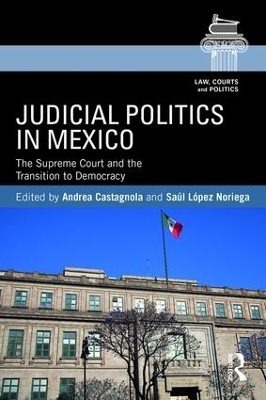
Judicial Politics in Mexico
Routledge (Verlag)
978-1-138-69782-9 (ISBN)
After more than seventy years of uninterrupted authoritarian government headed by the Partido Revolucionario Institucional (PRI), Mexico formally began the transition to democracy in 2000. Unlike most other new democracies in Latin America, no special Constitutional Court was set up, nor was there any designated bench of the Supreme Court for constitutional adjudication. Instead, the judiciary saw its powers expand incrementally. Under this new context inevitable questions emerged: How have the justices interpreted the constitution? What is the relation of the court with the other political institutions? How much autonomy do justices display in their decisions? Has the court considered the necessary adjustments to face the challenges of democracy?
It has become essential in studying the new role of the Supreme Court to obtain a more accurate and detailed diagnosis of the performances of its justices in this new political environment. Through critical review of relevant debates and using original data sets to empirically analyze the way justices voted on the three main means of constitutional control from 2000 through 2011, leading legal scholars provide a thoughtful and much needed new interpretation of the role the judiciary plays in a country’s transition to democracy
This book is designed for graduate courses in law and courts, judicial politics, comparative judicial politics, Latin American institutions, and transitions to democracy. This book will equip scholars and students with the knowledge required to understand the importance of the independence of the judiciary in the transition to democracy.
Andrea Castagnola is a Post-Doctoral Fellow in the Comparative Politics Department at the University of Bergen and is Assistant Professor at FLACSO-Mexico. Her research focuses on judicial politics in Latin America and comparative politics. Saúl López Noriega is Associate Professor at the Centro de Investigación y Docencia Económica (CIDE). He teaches courses on constitutional law and democracy, power, and media. His research focuses on issues of constitutional justice, democracy and constitutional courts, and media concentration.
Introduction
Tom Ginsburg
Chapter 1: The Transformations of the Role of the Mexican Supreme Court
Andrea Pozas-Loyo and Julio Ríos-Figueroa
Chapter 2: The Law as Power: Strategic Litigation in Mexico
Pedro Salazar Ugarte
Chapter 3: Are Mexican Justices true arbiters among political elites? An empirical analysis of the Court´s rulings from 2000-2011
Andrea Castagnola and Saúl López Noriega
Chapter 4: The Supreme Court and the (no) Rights Revolution. An Empirical Analysis of the Court´s Rulings 2000-2011
Andrea Castagnola and Saúl López Noriega
Chapter 5: Constitutional Change and the Supreme Court Institutional Architecture: Decisional Indeterminacy as an Obstacle to Legitimacy
Francisca Pou Giménez
Conclusion
Matthew C. Ingram
| Erscheinungsdatum | 24.05.2016 |
|---|---|
| Reihe/Serie | Law, Courts and Politics |
| Zusatzinfo | 8 Tables, black and white; 18 Line drawings, black and white; 18 Illustrations, black and white |
| Verlagsort | London |
| Sprache | englisch |
| Maße | 152 x 229 mm |
| Gewicht | 249 g |
| Themenwelt | Recht / Steuern ► Allgemeines / Lexika |
| Recht / Steuern ► EU / Internationales Recht | |
| Sozialwissenschaften ► Politik / Verwaltung ► Politische Systeme | |
| Sozialwissenschaften ► Politik / Verwaltung ► Staat / Verwaltung | |
| ISBN-10 | 1-138-69782-6 / 1138697826 |
| ISBN-13 | 978-1-138-69782-9 / 9781138697829 |
| Zustand | Neuware |
| Haben Sie eine Frage zum Produkt? |
aus dem Bereich


